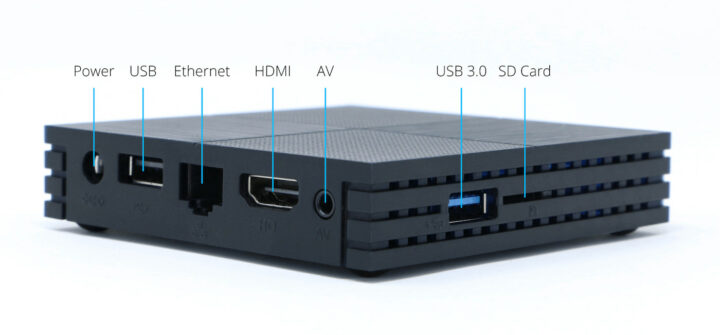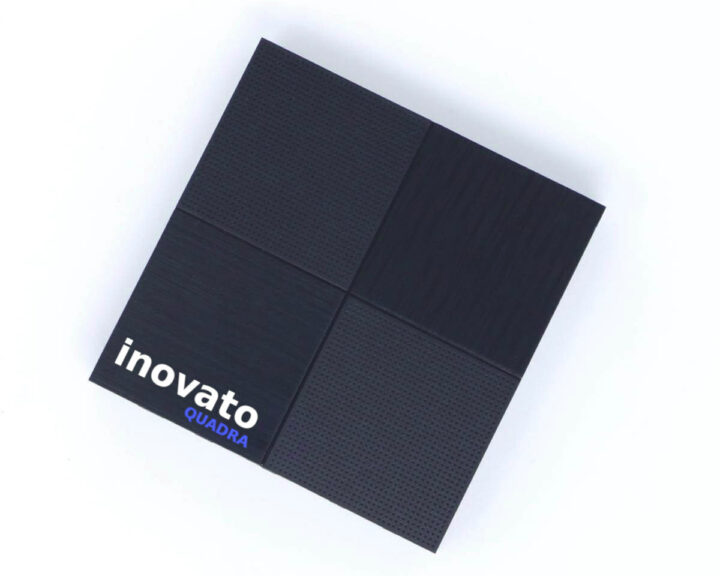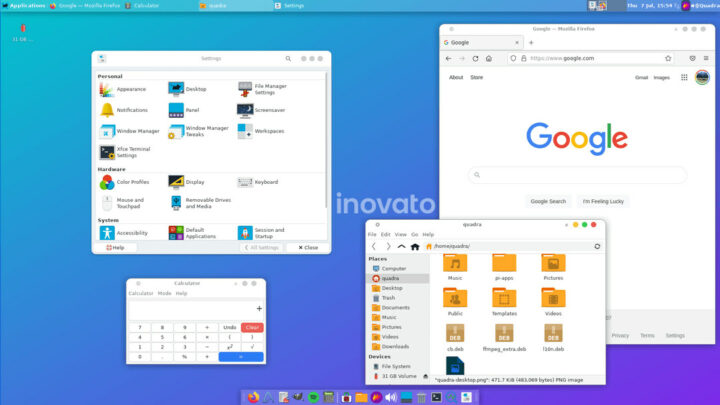Inovato Quadra is an Arm Linux mini PC based on Allwinner H6 quad-core Cortex-A53 processor with 2GB RAM, 16GB flash, and running Armbian-built Debian 11 Bullseye 64-bit.
If the device looks like a repurposed Android TV box, it is because it is based on the T95 Mini model with one HDMI 2.0 port, USB 3.0 and 2.0 ports, a microSD card slot, a Fast Ethernet port and WiFi 4 wireless connectivity.
Inovato Quadra specifications:
- SoC – Allwinner H6 quad-core Arm Cortex-A53 processor @ up to 1.7 GHz with Arm Mali-720 MP2 GPU
- System Memory – 2GB RAM
- Storage – 16GB eMMC flash, MicroSD card slot
- Video & Audio Output
- HDMI 2.0 port up to 4Kp60
- 3.5mm AV port with video composite and analog audio
- Networking
- 10/100M Ethernet port
- Wireless
- Quadra – 2.4 GHz 802.11n Wi-Fi 4, no Bluetooth (can be added with a USB dongle)
- Quadra Plus – Dual-band 802.11ac WiFi 5; Bluetooth 4.2 USB dongle
- USB – USB 3.0 port, 1x USB 2.0[prt
- Power Supply – 5V/2A power adapter included
- Dimensions – 92 x 92 x 22mm
 The Allwinner H6 is not exactly a powerhouse, and the Quadra is promoted as an alternative to Raspberry Pi 4, when the SBC is overkill, and for applications that do not need the GPIO header or MIPI CSI/DSI interfaces. The mini PC has the advantage of coming with an enclosure, a heatsink placed on the processor, a power supply, and an HDMI cable, plus a MicroSD card is not needed since the OS is preinstalled in the internal eMMC flash.
The Allwinner H6 is not exactly a powerhouse, and the Quadra is promoted as an alternative to Raspberry Pi 4, when the SBC is overkill, and for applications that do not need the GPIO header or MIPI CSI/DSI interfaces. The mini PC has the advantage of coming with an enclosure, a heatsink placed on the processor, a power supply, and an HDMI cable, plus a MicroSD card is not needed since the OS is preinstalled in the internal eMMC flash.
The Armbian image provided by Inovato relies on Debian 11 plus the lightweight XFCE desktop manager with a MacOS-like interface & dock. If you don’t like to run some random OS on a mini PC, the instructions to build the Armbian server or desktop images are provided, or you can directly check out the patches.
The Inovato Quadra sells for $29, while the Quadra Plus with WiFi 5, a Bluetooth 4.2 USB adapter, and a 4-port USB hub goes for $39. You’ll find both on the Inovata shop. There’s no contact information per se on the website, but the person behind the product is Michael Burmeister-Brown, former chief scientist at Datto cybersecurity company based in the US.

Jean-Luc started CNX Software in 2010 as a part-time endeavor, before quitting his job as a software engineering manager, and starting to write daily news, and reviews full time later in 2011.
Support CNX Software! Donate via cryptocurrencies, become a Patron on Patreon, or purchase goods on Amazon or Aliexpress







> Michael Burmeister-Brown, former chief scientist at Datto cybersecurity company based in the US
Cybersecurity? Then telling people to download sources/patches via http and using an example.com certificate for their website?
example.com certificate? Maybe Mr. Burmeister-Brown was also was in chargefor the hyundai “encryption”…
> the vehicle’s manufacturer had secured its system using keys that were not only publicly known but had been lifted from programming examples.
https://www.theregister.com/2022/08/17/software_developer_cracks_hyundai_encryption/
When I made a presentation about the security of their routers, the main belgian ISP sent a spy guy to the conference, and contacted me the days before, with one of those “cybersecurity” person with zillions of certifications on his Linkedin account:
http://www.zoobab.com/berec-routers-consultation
It took them 2 years to fix the flaw.
Should be fixed. I am still finishing the sites now as this is a new launch & the CNX post came out faster than I anticipated. Sorry for any remaining rough spots. But thanks for the call-out!
That explains “former” part of that sentence.
Does the emmc on the Allwinner H6 already run on fullspeed. 2 years ago, when I was still active with the pineH64, it seemed there was something wrong with the emmc driver for the H6. The speed with android was approx 130MB/s while on linux it was around 44MB/s.
Not sure how you benchmarked, but hdparm -t gives 126MB/s on the Quadra
The Plus model is temporarily out-of-stock, but should be in by end-of-week.
I would consider a S905X3 TV Box running Armbian with more memory, faster processor, GBE …
Yep. We are exploring as a higher end model. Won’t hit $29, but interesting!
As someone who recently repurposed a similar device (X9 MBox with Amlogic S905X) to use Armbian as a small backup server, I can definitely say it was worth it. And surely much more compared to replacing its horrible Android build with some Android TV fork.
Michael, you’ve certainly hit a niche market and I hope you expand to more devices and selling internationally.
Until you reach an international audience with your devices, you could also consider building and selling images of your Armbian/Debian variant for other SoCs as well, commonly used in these devices. E.g. mine did not come from an official Armbian build, it was rather built by an Armbian forum user who has now abandoned the Amlogic SoCs (which means these devices won’t get a newer kernel). I would definitely pay for an up to date Armbian image AND a device once you ship internationally.
Kudos on a great idea AND a product name that goes hand in hand with the device design. 😉
> I would definitely pay for an up to date Armbian image
That’s a funny idea. Paying Michael Burmeister-Brown for the work others did 🙂
[ apart from context here, there’s pretty much complexity on that item:
“the work”
what’s the definition for ‘value of work’ or ‘value of ideas/creativity’ on open source communities or societies for global contribution from different cultural customs (towards $29 devices)?
en.wikipedia.org/wiki/Work_ethic or
en.wikipedia.org/wiki/Value_of_work_done
what’s the ‘value of standardization’?
One fast example:
“The paper finds that it would take approximately $10.8 billion to build the Linux community distribution Fedora 9 in today’s dollars with today’s software development costs. It would take $1.4 billion to develop the Linux kernel alone.”]
[duplicate posting]
There is nothing proprietary about what we have done (except our company name). We have simply taken Armbian (which we love), updated some patches for this board, installed some software we think will be useful, etc. Anyone is welcome to copy & change the firmware, get some compatible hardware and sell locally. We’d love to see this and similar projects widely available in places we can’t be. We also plan to keep updating compatible boards and publishing more “How To” articles in the hope it can be helpful to others. Remember, you can always “build your own” (we tell you how) and pay us nothing. If fact, we encourage it!
Agreed. No need to pay us for the firmware. We are happy to have people use it on their own hardware and pay us nothing. Details on the site.
You might check out “ophub”. I have had mixed results and you may have to play with the dtb a bit to match your hardware combination, but worth a try!
@Michael Burmeister-Brown would you consider doing this with an X96S (same SOC as Radxa Zero), potentially with Debian rather than Armbian?
The product and the tag price is very interesting… maybe this can substitute my old cubietruck litle server. 😉
But for me to be a option to consider i need to buy this on Europe wharehouse
Same here!
I’d suggest getting a T95 mini locally and flash it. It isn’t that hard, and in doing so you’ll also have a recovery SD card. All the info you need is our our site. In fact, we had to think long and hard about whether we wanted to actually sell this vs just providing info on how to make it. In the end, selling won out to make it available for those that don’t want to or feel unable build their own. Obviously @ $29 profit wasn’t our motivation.
You can buy a H6 2GB 16GB on Amazon UK, £26 delivered. Just need to check it runs the software.
Don’t know how good Ubuntu is but if you go on Aliexpress there is a two day offer on Beelink T4 Pro for $80 4GB 64 Emmc , lists win10, Ubuntu. That gets you case, power supply too. Check for import taxes etc.